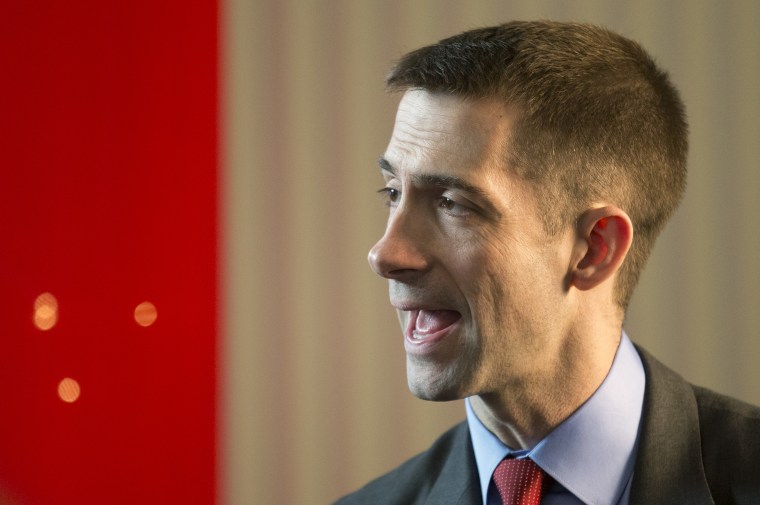After House Speaker John Boehner (R-Ohio) recently chastised President Obama for working towards a diplomatic solution with Iran, White House Press Secretary Josh Earnest effectively challenged the Republican leader. If Boehner thinks "the United States should bomb Iran to prevent them from obtaining a nuclear weapon, then he should have the courage of his convictions to actually say so," Earnest said.
It was a forceful response rooted in fact. Most politicians are reluctant to call for yet another costly war in the Middle East, but GOP lawmakers are, in practical terms, pushing for a military confrontation when they condemn international agreements and the diplomatic process.
Sen. Tom Cotton (R-Ark.), the ringleader of the infamous sabotage letter a month ago, has generally been more candid about his intentions, so it was good to see Jake Tapper on Friday press the far-right freshman on his preference for war.
TAPPER: So you think war, military action would be preferable to this deal? COTTON: Jake, the president again likes to present a false choice. TAPPER: Well, you just talked about military action, though. COTTON: And there's lots of kinds of military action.
When the host pressed further, asking the senator if he would "support theoretically airstrikes against their nuclear facilities over taking this deal," Cotton didn't disagree, suggesting instead that this posture is effectively the Obama administration's position. (It isn't.)
The lawmaker added, "Like all Americans, I want to see a negotiated settlement." There's evidence to the contrary -- in January, Cotton told the Heritage Foundation he intended to push for additional sanctions, the "intended consequence" of which would be to derail a diplomatic resolution. The Republican senator said this was "a feature, not a bug."
Nearly three months later, Cotton still seems to prefer a military confrontation.
And what's wrong with that? Why, specifically, should Americans prefer an international agreement that curtails Iran's nuclear capabilities to airstrikes?
Part of the answer, of course, is that starting yet another costly war in the Middle East -- this time against one of the largest countries in the region -- would itself be a deadly, destabilizing conflict.
The use of force could, in theory, push back Iran's nuclear-weapons program, but it would also spur Tehran to accelerate its ambitions, causing its neighbors to do the same.
As President Obama told Thomas Friedman over the weekend, "We know that a military strike or a series of military strikes can set back Iran's nuclear program for a period of time -- but almost certainly will prompt Iran to rush towards a bomb, will provide an excuse for hard-liners inside of Iran to say, 'This is what happens when you don't have a nuclear weapon: America attacks.'"
In other words, we have a pretty good idea what would happen if we took Cotton's advice and tried to resolve the situation through airstrikes. We'd see another U.S. war in the Middle East; we'd alienate our allies; we'd accelerate Iran's nuclear ambitions; and we'd signal to the rest of the world that the best way to prevent an American offensive is to get a nuclear weapon as quickly as possible.
Indeed, let's not forget that the Bush/Cheney administration -- not exactly pacifists when it came to starting wars -- weighed a military option against Iran, but it concluded that "a military strike on Iran's nuclear facilities would be a bad idea -- and would only make it harder to prevent Iran from going nuclear in the future."
The Obama administration has reached the same conclusion -- and unlike Bush/Cheney, Obama and his team took concrete diplomatic action to secure a potential victory.
